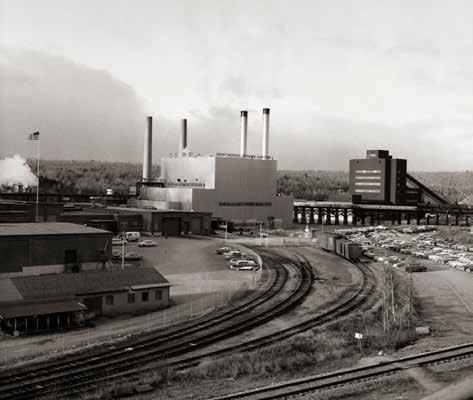
3 minute read
War”
by Brian Swartz
Foxcroft doctor happily married into an up-and-coming Maine family on June 3, 1857 — but tragedy would tear apart his own little family just six years later.
Advertisement
Born to Salmon and Abigail (Blake) Holmes in Foxcroft on September 8, 1827, Freeland Salmon Holmes grew up Piscataquis County, carved out of Penobscot and Somerset counties by the Maine Legislature in March 1838. After graduating from Bowdoin College in 1850, he studied medicine with his uncle, Dr. Job Holmes, who lived in Calais.
Freeland Holmes then completed his medical education at Columbia College in Washington, D.C. He returned to Maine in 1854, practiced medicine in Orono, and later took over the medical practice established by Dr. Josiah Jordan, who moved to Foxcroft.
Sometime during the next few years Holmes met Caroline Ann Washburn, almost six years younger than him. She hailed from Livermore, where she was born to Israel and Martha (Benjamin) Washburn on January 30, 1833. A surviving photograph indicates that she was an attractive woman with bright, clear eyes and dark hair, possibly brown in color. She attended the Waterville Liberal Institute and the Gorham Female Seminary; perhaps she and the good doctor crossed paths prior to his arrival in Orono, but how Caroline and Freeland became acquainted is unknown.
An H.L. Leonard performed their wedding in Orono. Freeland likely did not realize that Caroline hailed from a talented Maine family just stepping onto the national stage.
His bride was the youngest of eleven children, of whom ten survived to adulthood. The oldest child (and son) was Israel Washburn Jr., a self-effacing attorney rising to prominence in the Republican Party. Elected Maine’s governor in autumn 1860, he guided the state during the first two years of the Civil War.
Algernon, the second child, became a successful Hallowell banker. The Washburns named their third child Elihu (possibly after the Book of Job character). He moved to Illinois and added an “e” to his surname. Venturing into politics, he befriended fellow lawyer Abraham Lincoln and helped steer his rising political star into the White House.
The Washburns’ fourth child, Cadwallader, practiced law in Wisconsin and won election to Congress from that state. He commanded the 2nd Wisconsin Cavalry during the Civil War, returned to Congress afterwards, and then won election as Wisconsin’s governor. A major general when the war ended, he became the “general” in General Mills.
The fifth Washburn sibling was Martha, followed by brothers Charles and Samuel, sister Mary, and two brothers William. The surviving William (known as “W.D”) moved to Minnesota (as had Mary and her husband), worked in Cadwallader’s milling company, ran a railroad, and founded the Pillsbury-Washburn Milling Company (known today as the Pillsbury Company).
Caroline followed W.D. She lived quietly with Dr. Freeland, who relocated his medical practice to Foxcroft. “He was very highly-esteemed here in the practice of his profession, became a universal favorite, and seldom failed to secure the confidence of all who employed him,” recalled Dover newspaper publisher George Edes.
Holmes was “one of the best educated Physicians in the State” and “was not one of those who made friends by flattery and fawning, but ever sought truth and right as his guide in all his transactions in life,” Edes said.

A daughter, Fanny, was born to the Holmes in 1859. Caroline was pregnant with her second child when her husband became the 6th Maine Infantry Regiment’s surgeon on March 13, 1862. Freeland would have known many Piscataquis County men (including residents of Dover, Foxcroft, Guilford, and Sebec) who had enlisted in the regiment in spring 1861.
The War Department commissioned Freeland on March 25, 1862. His son, Frank, was born on June 8. The good doctor’s “departure for the army was a cause of very general regret,” Edes said. Patients whom Freeland often treated in their homes looked forward with “high expectations to the time when he should return to us improved and matured by the practice of a profession he loved.”
(cont. on page 28)
(cont. from page 27)
His patients hoped that Freeland “might again apply his skillful healing to their various ailments,” Edes said.
Freeland Holmes cared for the 6th Maine’s sick and wounded soldiers during the Peninsula Campaign and during the winter of 1862-1863, a particularly brutal period for the Army of the Potomac. He looked after the multiple 6th Maine soldiers wounded during the Chancellorsville campaign in May 1863, and he should have accompanied the regiment to Gettysburg.
“But it was not meant to be,” Edes admitted. Freeland caught diptheria as his regiment headed for Maryland; confined to an army field hospital in Germantown, Virginia, he died on June 23, 1863. His embalmed body was shipped home by rail; probably unloaded from a Maine Central Railroad train in Newport, the casket would have been transported to Foxcroft by a horse-drawn hearse or wagon.
The heart-broken Caroline would have received both the casket and visitors in her home until the funeral held in the Foxcroft Congregational Church at 2 p.m., Thursday, July 2. She laid Freeland to rest in the Rural Grove Cemetery, located on modern Route 15 on the western edge of Dover-Foxcroft.
Caroline never remarried. Still living in Foxcroft with her children in 1870, she moved with them to Minneapolis by 1880. Her brother, William, lived nearby. Caroline died at age 87 in Minneapolis on November 15, 1920. She lies beside Freeland in the Rural Grove Cemetery.


















